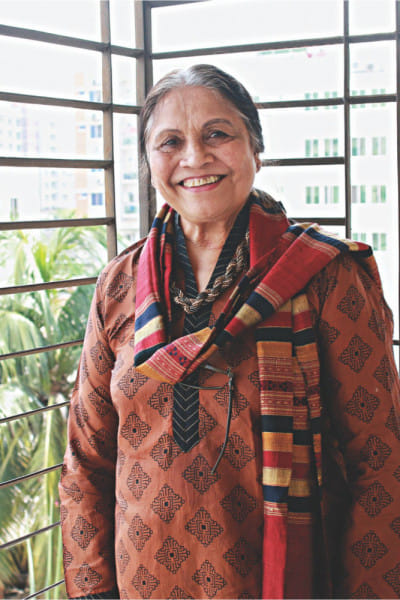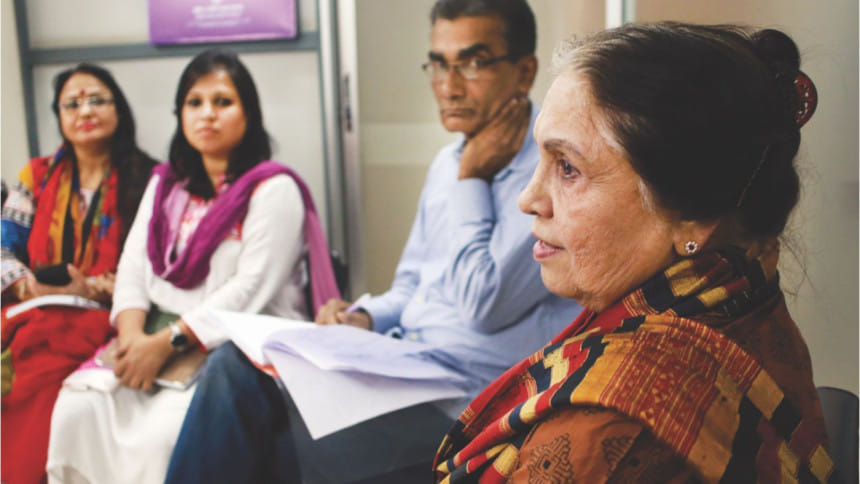Healing Minds

"Psychosocial counselling is very appropriate, especially in Bangladesh, where there are a lot of conditionings, and therefore a lot of conflicts. It's very practically possible here," says P K Saru, an Indian psychotherapist and consultant with 20 years of experience. Psychosocial counselling is one of the most effective therapeutic interventions becoming popular day by day because of its effectiveness among people having psychosocial problems and minor mental disturbances.
"People in our region think going to a therapist or a counsellor means you are mentally disturbed to a point of madness. Mental illness or disturbance, of any kind, is looked down upon. Whereas even highly functioning people like me and you need therapy. We face conflicts in our day-to-day lives, we get stressed and low in our energies, and at times like these- psychosocial counselling is already warranted, let alone to those who face bigger traumas."
P K Saru has been visiting Bangladesh for the past 13 years to work with Ain O Salish Kendra, upon the request of Khursheed Erfan Ahmed, Co-founder, past director and advisor of Ain O Salish Kendra, a national legal aid and human rights organisation.
Saru is internationally accredited in Teaching and Supervising Transactional Analyst (TSTA) in the field of psychotherapy. She is a master practitioner in the neurolinguistic programme (NLP) and has a diploma in Child Development. She is also the managing trustee of Centre for Holistic Integrated Learning and Development and the Director of Asha Counselling and Training Services.
"Keeping the need for psychological well-being in mind, Khursheed apa wanted someone to provide a diploma course in psychosocial counselling. I first came and did a basic course, and then based on that, we chose students to move on to the diploma course. Such a thing would not only train individuals, but would also spread awareness in the society, which is really the main purpose." says Saru.
"We have already given 3 diploma courses, and a lot of people are also being trained for another international certification. As a result, there was already a vibrant community forming who are using Transactional Analysis. All the programmes and courses of mine were hosted and sponsored by Ain O Salish Kendra."
P K Saru comes back to Dhaka this year in September for the South Asian Transactional Analysis Conference- a psychology conference using Transactional Analysis framework for development, growth and well-being. The keynote speakers of the conference are P K Saru herself, Khursheed Erfan Ahmed, English psychotherapist John Heath and Australian psychotherapist Elana Leigh. The conference will include over 35 workshops by moderators from over 12 countries. The theme of the conference is 'Freedom Within', and is open to all aspirants of personal and professional growth and change- therapists, counsellors, educators, consultants, trainers, corporate executives, coaches, parents and students.

Psychosocial counselling, over the past years, has become popular in our country, and while methods like psycho-drama, Freudian method, solution-focused therapy and neurolinguistic programming (NLP) are often used; Transactional Analysis (TA) has proved to be a very pragmatic approach. The TA framework deals with personality, communication, child development, and more. "It deals with the day-to-day life, which is why it has been proven to be a very powerful tool for therapy," says Saru. Here, 'transaction' means 'give and take', which Eric Berne, psychiatrist and originator of TA, felt relationships were all about. "So whenever we analyse the communication, the stimulus and the response we give in a relationship, we can understand the personalities of the people in it. It is basically analysing relationships," she says, "At the core of every conflict is estrangement of a relationship. So when we become aware of what is wrong with it, and are aware of the changes that can take place, the options we have for change and growth, the relationship becomes better- there is peace, there is joy and well-being, and that is the basics of TA."
The framework primarily focuses on growth, change and cure. "It is essential for healing, which takes place at an emotional level, not at a cognitive level, which the TA framework encompasses. There are many different models that handle the same situation. If you look closely at it, the truth is one- the paths are many."
Ain O Salish Kendra had successfully used the TA framework with survivors of the Rana Plaza tragedy. "When there is a major trauma, like the Rana Plaza Tragedy, as a victim, you are hit on a psychological level very badly. No cognition or thinking can take place. What you need is somebody to hold your hand and help you address your trauma, and to tell you that they are there. You need someone who can 'give' in the 'give and take' relationship. That holding of comfort, of release is what TA provides. They need to hold someone and cry, and vent. Some of them are very angry, some are very sad- they lost everything they had, they lost lives, possessions, and they lost a bread-winner, so they will go into their shells. TA gives them the chance to ventilate- which itself is a part of healing," says Saru.
According to P K Saru, a psychosocial counsellor has to have a secure base. "They have to believe that this person, the patient, has the potential to change, grow and heal. When the therapist believes that the power is in the patient, they can facilitate that power and that is the ultimate scope of the therapist."
P K Saru's enthusiasm and dedication towards Bangladesh is inspiring. "I am always very impressed by the dedication of the people who have attended our trainings. I generally love the spirit of the people in Bangladesh, even if you meet someone impoverished on the streets, you will see- they look directly into your eyes, they make contact, which is proof of the humaneness in them," she says.
Those who have been trained by P K Saru and taken the diploma are already using the framework and skills in such a powerful way in helping people grow, change, and heal. "I see tremendous growth in a scientific way. That is what really inspires me to come back every time. I wanted to show what could be done when you are really passionate about making a change, and here we are- making changes, healing minds."

 For all latest news, follow The Daily Star's Google News channel.
For all latest news, follow The Daily Star's Google News channel. 



Comments